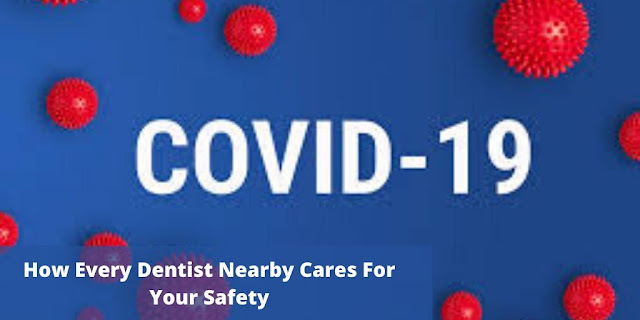How Every Dentist Nearby Cares For Your Safety
Do You Feel Going To Your Dentist Nearby Is Safe?
Initially, The first question that comes to mind in times of the coronavirus pandemic. Moreover, Is the dental clinic safe? Dental care involves face-to-face communication with patients, and chances of transmission of infections through cough, sneeze, and droplet inhalation are high. Be assured that your dentist is following the Indian Dental Association’s preventive guidelines to keep the dental clinic safe.
Important Guidelines For Patients Visiting A Dentist Nearby
- Good handwashing is a simple and effective way of curbing the spread of germs.
- Most Importantly, hand sanitization is for everyone visiting the dental clinic.
- The moment you enter the dental clinic, sanitize your hands with the alcohol-based hand rub.
- Dispose of used tissues in the no-touch receptacles.
You must wear a mask and expect social distancing in the waiting area for your safety. You should get a periodic Temperature check with a contact-free thermometer. Detailed medical history to check for possible exposure to the coronavirus is a must.
Alert Dental staff immediately identifies patients with acute respiratory illness. A compulsory screen for fever and COVID-19 symptoms for all dental patients before they enter the dental setting helps in avoiding the spread of the infection. Contact the dentist nearby who can help you.
Safety measures followed by your dentist nearby
- The entire dental clinic is thoroughly fumigated with hospital-grade disinfectants to keep you safe.
- Even before entering the examining room, the assistants clean all surfaces like the dental chair, dental light, hand rest, trays, and drawer handles.
- They also disinfect the instruments with sodium hypochlorite or NaClO before and after each patient. This is vital as COVID-19 survives on stainless steel and plastic for several hours.
- UV light sterilization for the clinical area destroys airborne microorganisms.
Prevent COVID-19 transmission from aerosol particles
The dentist would ask you to rinse the mouth with a 1% hydrogen peroxide (H202) or povidone-iodine solution. Moreover, The virus is vulnerable to oxidative agents and thus these reduce the salivary load of oral microbes. Dental devices used in your mouth produce aerosol and droplets, which mix with blood and saliva. This is common when your dentist uses a drill for scaling and polishing.
What are the precautions that are taken by a dentist
The dentist would apply a rubber dam to reduce saliva-and-blood contaminated aerosol when during dental ultrasonic procedures. Extra high-volume oral suction used along with regular suction reduces splatter.
HVE or High Volume Evacuator
Aerosol particles can linger in the operatory for several hours posing a risk to patients.HVE or High Volume Evacuator controls aerosolized particles, even before they leave a patient’s mouth. These instruments reduce airborne contamination by 90-98% controlling the risk of disease transmission.
HVE or High Volume Evacuator alone cannot reduce air contamination. Dental air purifiers filter even the smallest airborne particles which include dust, bio-aerosols, mold, and odors. Moreover, The dental clinic has high-efficiency particulate arresting (HEPA) air filters which capture 99.97% of the contaminants, keeping the patient, dentist, and the dental staff safe. Thus, The HEPA air filters prevent the spread of infectious diseases with in-built UV light which kills mold, bacteria, and viruses.
PPE for Dentist, Staff, and Consultants
The dentist uses N95 respirators for higher protection against respiratory disease. The N95 achieves a close facial fit and blocks 95% of very small test particles, serving as excellent PPE (Personnel Protective Equipment). The dental staff uses three-layered surgical masks when interacting with patients. Hence, If the dental staff provides aerosol-generating procedures, they will use the N95 respirator.
Dentists and staff wear gloves and gowns to prevent the soiling of clothes where activities are likely to generate splashes and sprays of body fluids. Goggles offer eye protection which is standard procedure PPE. After dental procedures that generate droplets or aerosols, the dentist and staff discard the N95 respirator and gloves, immediately performing hand hygiene. Finally, All eye protection wear follows careful disposal methods and not reused.
Do patients want to know if the coronavirus can spread through dental instruments?
Sterilization destroys viruses, bacteria, and fungi. Your Dentist destroys all instruments which penetrate oral soft tissue or bone tissue These are critical items like surgical instruments, periodontal knives, and dental scaling instruments. The dentist sterilizes critical dental instruments in an autoclave. This is a self-locking machine that sterilizes with steam under high pressure. Thus coronavirus cannot spread through sterilized dental instruments.
Sterilization
The autoclave chamber reaches temperatures of 121 degrees to sterilize instruments to achieve the best results. All orthodontic instruments use dry heat sterilization methods. Hence, You can’t catch COVID-19 from Sterilized surgical instruments and extraction forceps. Moreover, Syringes, brushes, and plastic orthodontic brackets are disposed of after a single-use. Thus, No chance of catching any infection here.
Disinfection of dental impressions
Dental impressions can be a source of transmission of infection. Hence, They can get cross-contaminated by the patient’s blood and saliva. Dental staff disinfects and label dental impressions used to make crowns and bridges. Dental impressions are washed with water to reduce microbial load. Finally, Disinfection with NaClO kills all microbes.
Subscribe Now! to get the Latest Dental Tips, Home Dental Remedies, Self Assessment Oral Health Checklist, and More.........
Read More Blogs
What are the types of foods that clean your teeth while you eat?







good to know dentist in bangalore are up to date with covid-19
ReplyDelete